Reflective Models in Business Research: Kolb's & Onion Model Analysis
VerifiedAdded on 2023/06/10
|7
|1315
|98
Report
AI Summary
This report explores the application of reflective models in business research, focusing on Kolb's Learning Cycle and the Onion model. It reflects on the research process concerning changes in GDP after COVID-19, detailing the challenges faced and the strategies employed to overcome them. The report explains Kolb's four stages—Concrete Experience, Reflective Observation, Abstract Conceptualisation, and Active Experimentation—and their application to the research topic. Additionally, it examines the Onion model's elements, including mission, identity, beliefs, competencies, behavior, and environment, to provide a comprehensive understanding of the research experience. The study concludes that reflective models are valuable tools for researchers, enabling them to analyze their experiences and improve their research methodologies. Desklib offers a platform to access this and similar solved assignments.
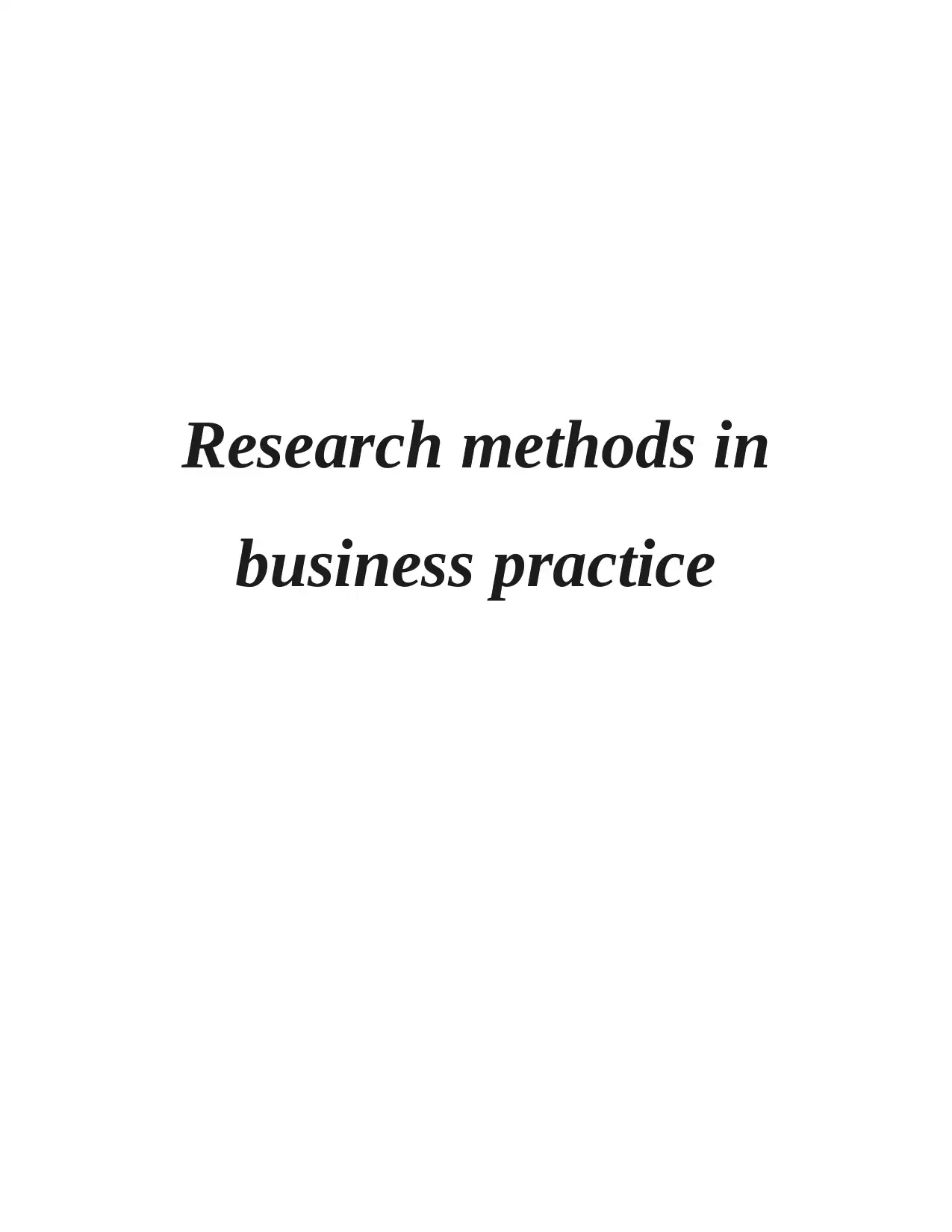
Research methods in
business practice
business practice
Paraphrase This Document
Need a fresh take? Get an instant paraphrase of this document with our AI Paraphraser
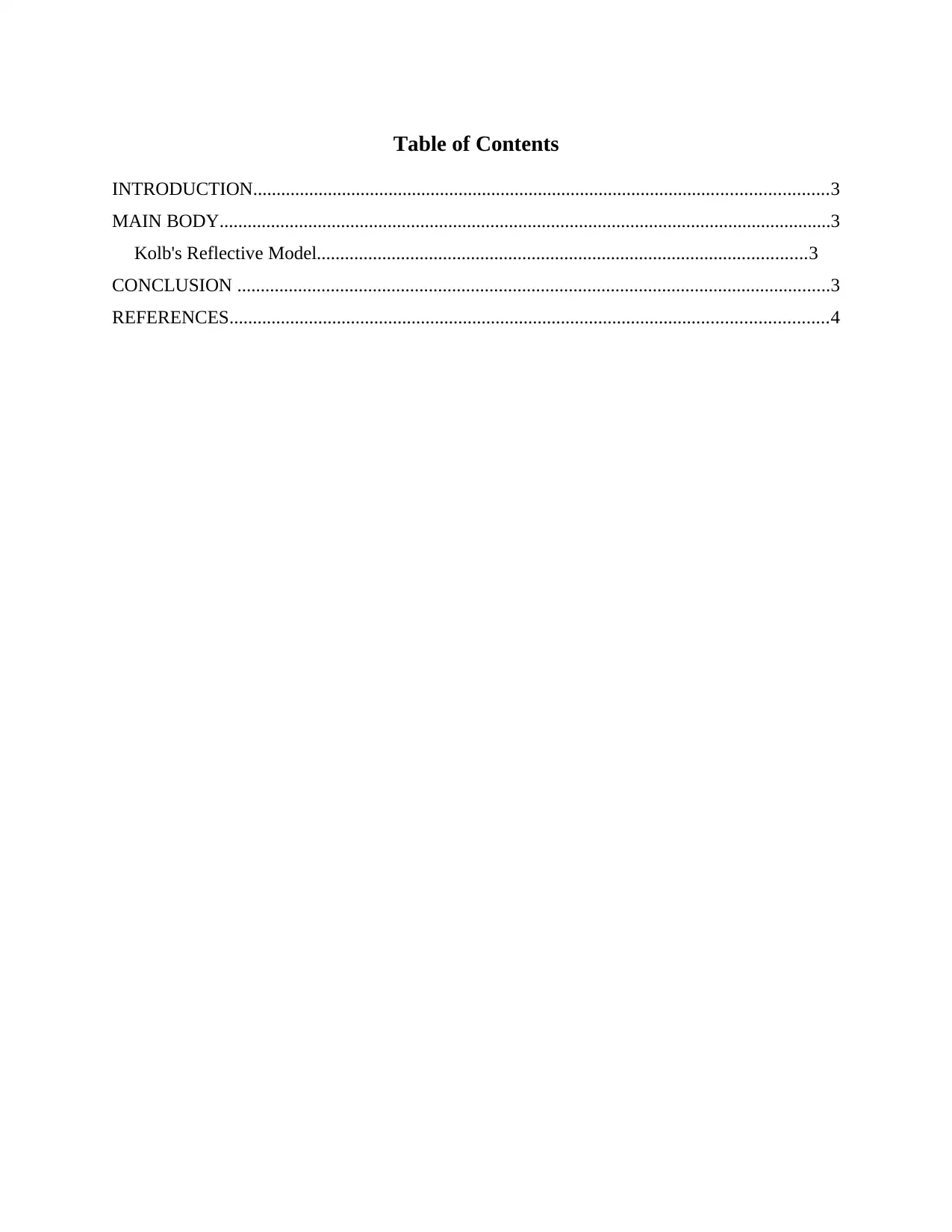
Table of Contents
INTRODUCTION...........................................................................................................................3
MAIN BODY...................................................................................................................................3
Kolb's Reflective Model.........................................................................................................3
CONCLUSION ...............................................................................................................................3
REFERENCES................................................................................................................................4
INTRODUCTION...........................................................................................................................3
MAIN BODY...................................................................................................................................3
Kolb's Reflective Model.........................................................................................................3
CONCLUSION ...............................................................................................................................3
REFERENCES................................................................................................................................4
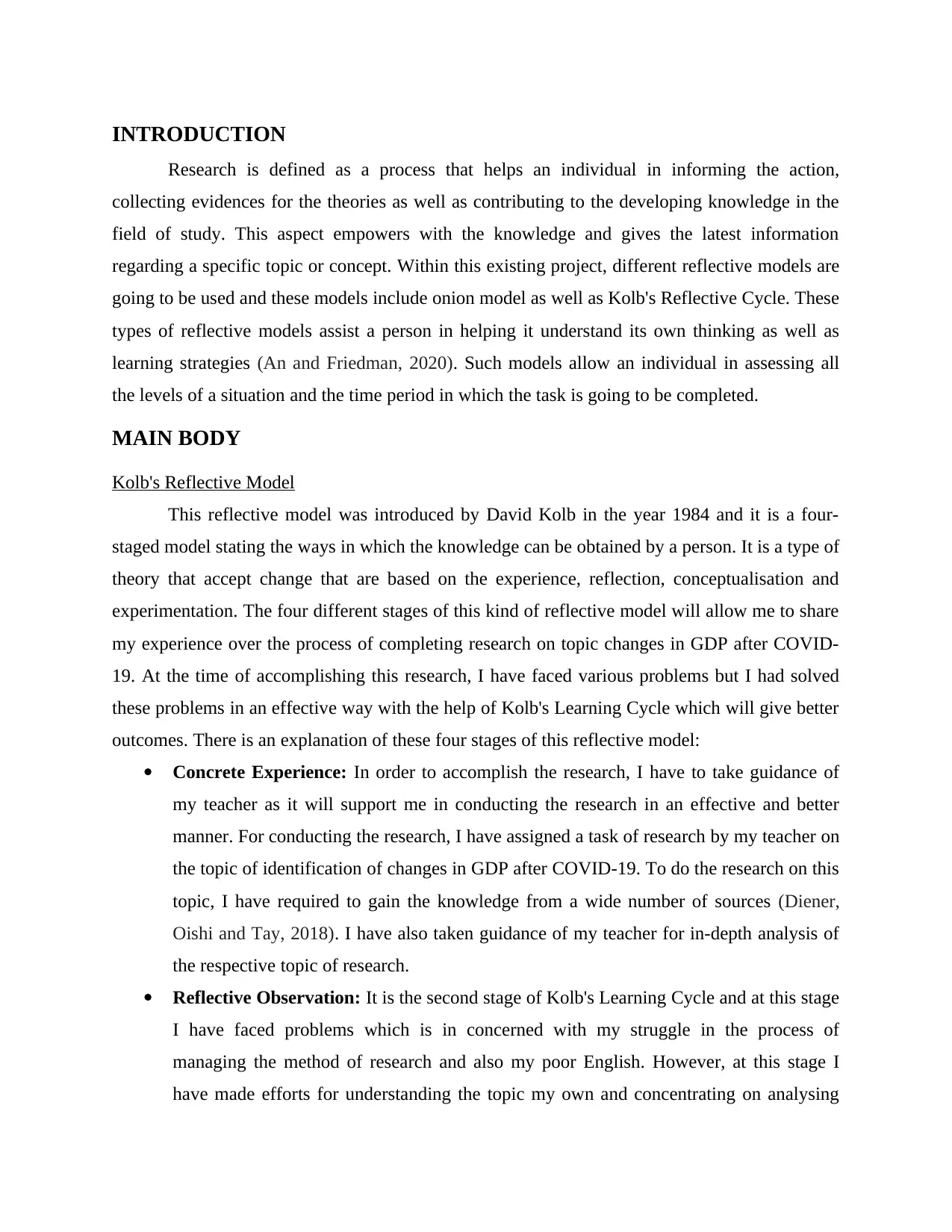
INTRODUCTION
Research is defined as a process that helps an individual in informing the action,
collecting evidences for the theories as well as contributing to the developing knowledge in the
field of study. This aspect empowers with the knowledge and gives the latest information
regarding a specific topic or concept. Within this existing project, different reflective models are
going to be used and these models include onion model as well as Kolb's Reflective Cycle. These
types of reflective models assist a person in helping it understand its own thinking as well as
learning strategies (An and Friedman, 2020). Such models allow an individual in assessing all
the levels of a situation and the time period in which the task is going to be completed.
MAIN BODY
Kolb's Reflective Model
This reflective model was introduced by David Kolb in the year 1984 and it is a four-
staged model stating the ways in which the knowledge can be obtained by a person. It is a type of
theory that accept change that are based on the experience, reflection, conceptualisation and
experimentation. The four different stages of this kind of reflective model will allow me to share
my experience over the process of completing research on topic changes in GDP after COVID-
19. At the time of accomplishing this research, I have faced various problems but I had solved
these problems in an effective way with the help of Kolb's Learning Cycle which will give better
outcomes. There is an explanation of these four stages of this reflective model:
Concrete Experience: In order to accomplish the research, I have to take guidance of
my teacher as it will support me in conducting the research in an effective and better
manner. For conducting the research, I have assigned a task of research by my teacher on
the topic of identification of changes in GDP after COVID-19. To do the research on this
topic, I have required to gain the knowledge from a wide number of sources (Diener,
Oishi and Tay, 2018). I have also taken guidance of my teacher for in-depth analysis of
the respective topic of research.
Reflective Observation: It is the second stage of Kolb's Learning Cycle and at this stage
I have faced problems which is in concerned with my struggle in the process of
managing the method of research and also my poor English. However, at this stage I
have made efforts for understanding the topic my own and concentrating on analysing
Research is defined as a process that helps an individual in informing the action,
collecting evidences for the theories as well as contributing to the developing knowledge in the
field of study. This aspect empowers with the knowledge and gives the latest information
regarding a specific topic or concept. Within this existing project, different reflective models are
going to be used and these models include onion model as well as Kolb's Reflective Cycle. These
types of reflective models assist a person in helping it understand its own thinking as well as
learning strategies (An and Friedman, 2020). Such models allow an individual in assessing all
the levels of a situation and the time period in which the task is going to be completed.
MAIN BODY
Kolb's Reflective Model
This reflective model was introduced by David Kolb in the year 1984 and it is a four-
staged model stating the ways in which the knowledge can be obtained by a person. It is a type of
theory that accept change that are based on the experience, reflection, conceptualisation and
experimentation. The four different stages of this kind of reflective model will allow me to share
my experience over the process of completing research on topic changes in GDP after COVID-
19. At the time of accomplishing this research, I have faced various problems but I had solved
these problems in an effective way with the help of Kolb's Learning Cycle which will give better
outcomes. There is an explanation of these four stages of this reflective model:
Concrete Experience: In order to accomplish the research, I have to take guidance of
my teacher as it will support me in conducting the research in an effective and better
manner. For conducting the research, I have assigned a task of research by my teacher on
the topic of identification of changes in GDP after COVID-19. To do the research on this
topic, I have required to gain the knowledge from a wide number of sources (Diener,
Oishi and Tay, 2018). I have also taken guidance of my teacher for in-depth analysis of
the respective topic of research.
Reflective Observation: It is the second stage of Kolb's Learning Cycle and at this stage
I have faced problems which is in concerned with my struggle in the process of
managing the method of research and also my poor English. However, at this stage I
have made efforts for understanding the topic my own and concentrating on analysing
⊘ This is a preview!⊘
Do you want full access?
Subscribe today to unlock all pages.

Trusted by 1+ million students worldwide
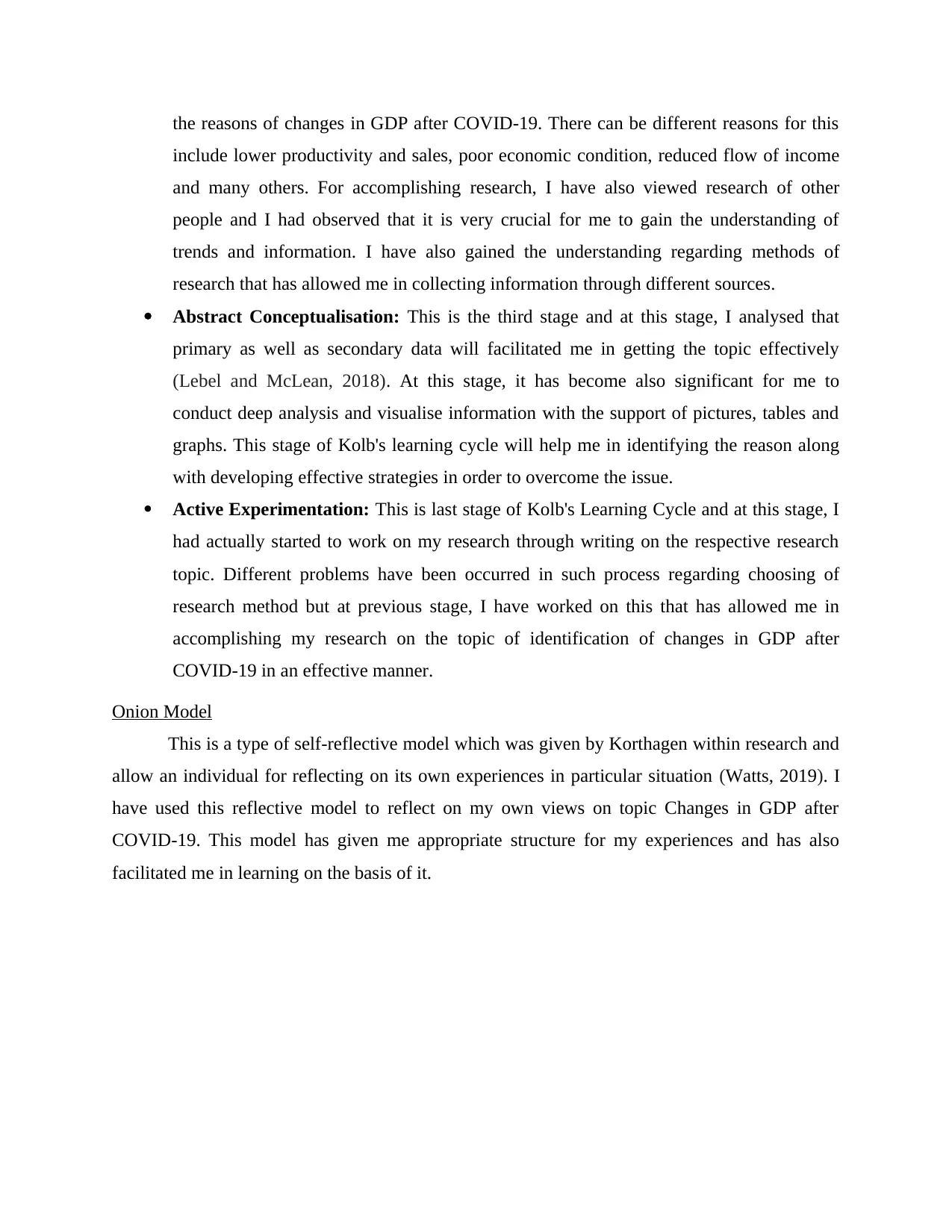
the reasons of changes in GDP after COVID-19. There can be different reasons for this
include lower productivity and sales, poor economic condition, reduced flow of income
and many others. For accomplishing research, I have also viewed research of other
people and I had observed that it is very crucial for me to gain the understanding of
trends and information. I have also gained the understanding regarding methods of
research that has allowed me in collecting information through different sources.
Abstract Conceptualisation: This is the third stage and at this stage, I analysed that
primary as well as secondary data will facilitated me in getting the topic effectively
(Lebel and McLean, 2018). At this stage, it has become also significant for me to
conduct deep analysis and visualise information with the support of pictures, tables and
graphs. This stage of Kolb's learning cycle will help me in identifying the reason along
with developing effective strategies in order to overcome the issue.
Active Experimentation: This is last stage of Kolb's Learning Cycle and at this stage, I
had actually started to work on my research through writing on the respective research
topic. Different problems have been occurred in such process regarding choosing of
research method but at previous stage, I have worked on this that has allowed me in
accomplishing my research on the topic of identification of changes in GDP after
COVID-19 in an effective manner.
Onion Model
This is a type of self-reflective model which was given by Korthagen within research and
allow an individual for reflecting on its own experiences in particular situation (Watts, 2019). I
have used this reflective model to reflect on my own views on topic Changes in GDP after
COVID-19. This model has given me appropriate structure for my experiences and has also
facilitated me in learning on the basis of it.
include lower productivity and sales, poor economic condition, reduced flow of income
and many others. For accomplishing research, I have also viewed research of other
people and I had observed that it is very crucial for me to gain the understanding of
trends and information. I have also gained the understanding regarding methods of
research that has allowed me in collecting information through different sources.
Abstract Conceptualisation: This is the third stage and at this stage, I analysed that
primary as well as secondary data will facilitated me in getting the topic effectively
(Lebel and McLean, 2018). At this stage, it has become also significant for me to
conduct deep analysis and visualise information with the support of pictures, tables and
graphs. This stage of Kolb's learning cycle will help me in identifying the reason along
with developing effective strategies in order to overcome the issue.
Active Experimentation: This is last stage of Kolb's Learning Cycle and at this stage, I
had actually started to work on my research through writing on the respective research
topic. Different problems have been occurred in such process regarding choosing of
research method but at previous stage, I have worked on this that has allowed me in
accomplishing my research on the topic of identification of changes in GDP after
COVID-19 in an effective manner.
Onion Model
This is a type of self-reflective model which was given by Korthagen within research and
allow an individual for reflecting on its own experiences in particular situation (Watts, 2019). I
have used this reflective model to reflect on my own views on topic Changes in GDP after
COVID-19. This model has given me appropriate structure for my experiences and has also
facilitated me in learning on the basis of it.
Paraphrase This Document
Need a fresh take? Get an instant paraphrase of this document with our AI Paraphraser
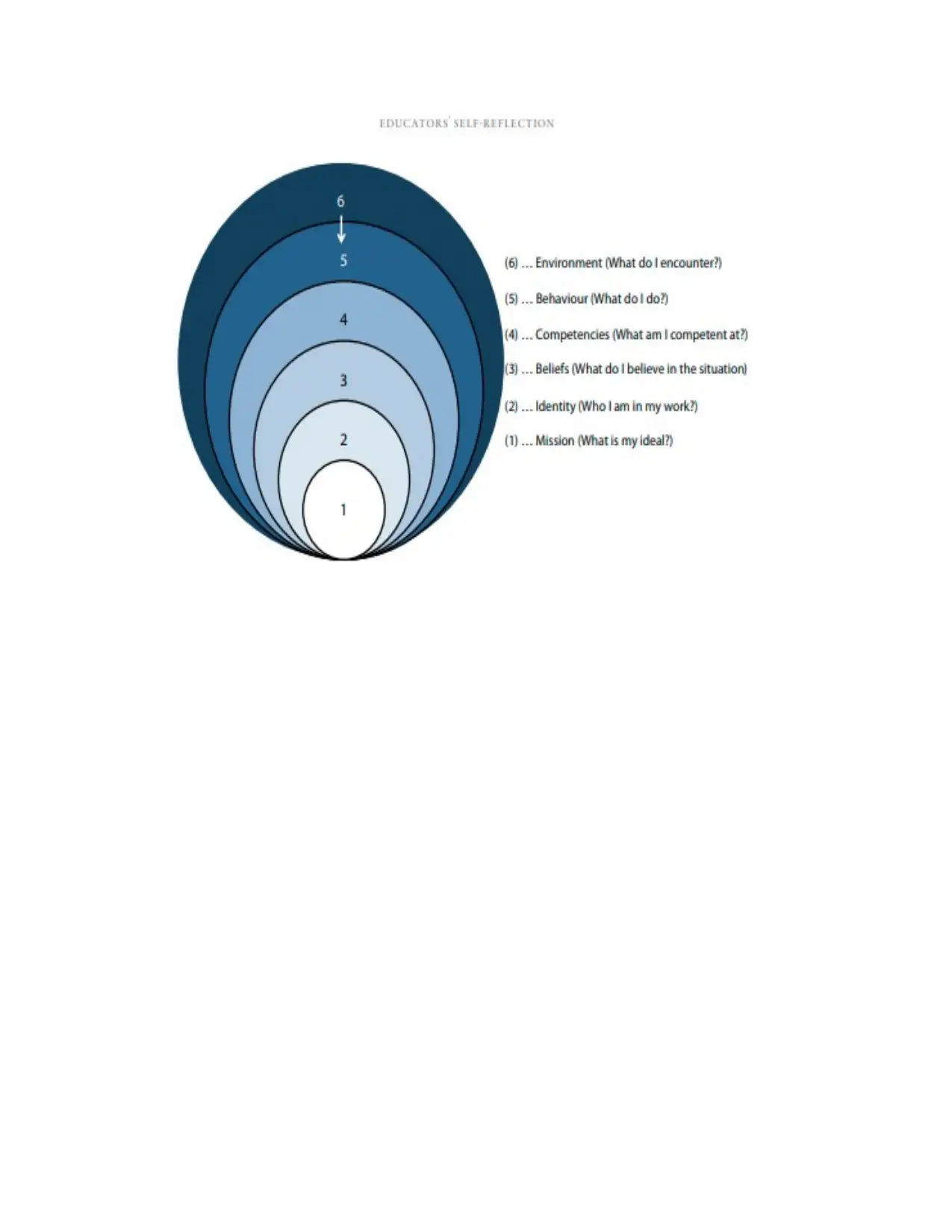
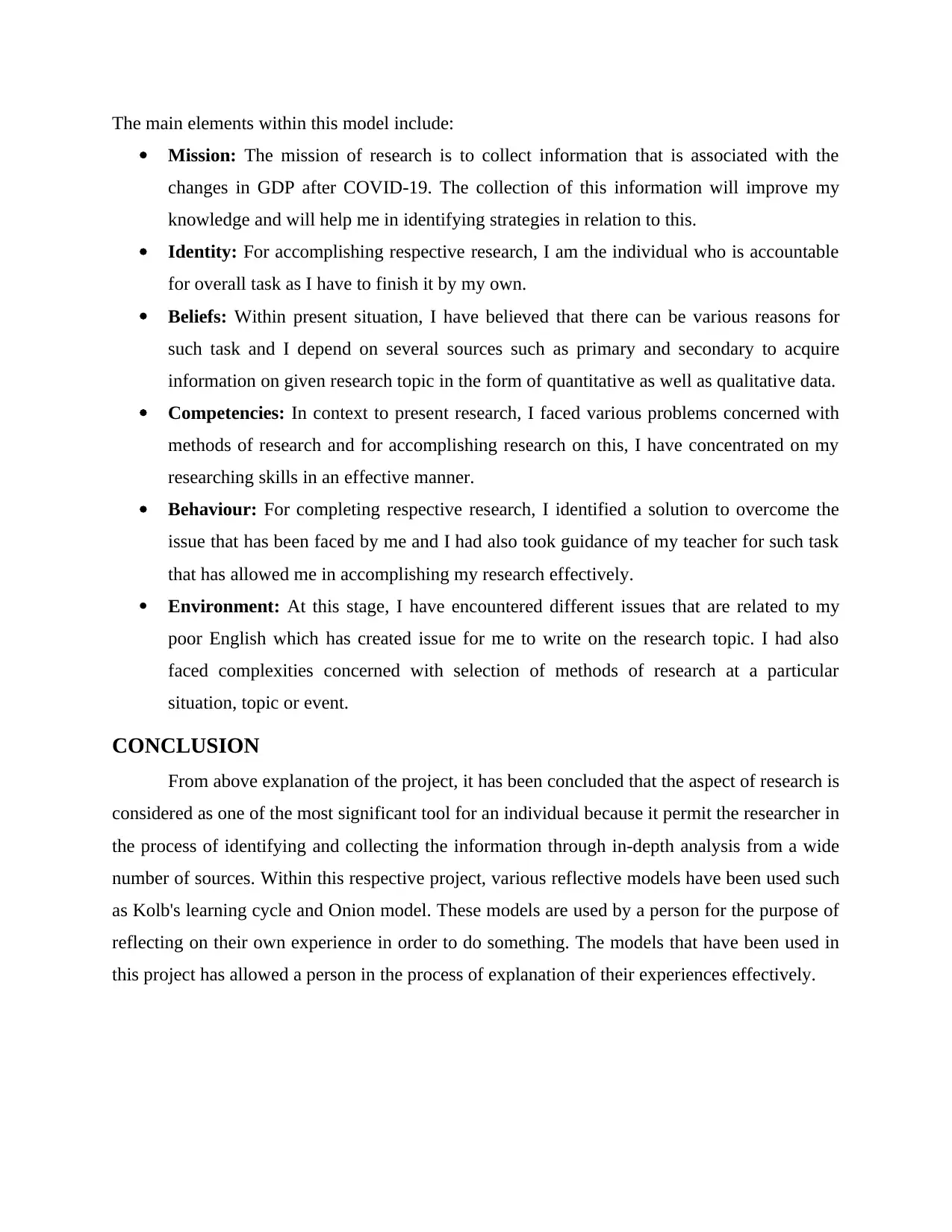
The main elements within this model include:
Mission: The mission of research is to collect information that is associated with the
changes in GDP after COVID-19. The collection of this information will improve my
knowledge and will help me in identifying strategies in relation to this.
Identity: For accomplishing respective research, I am the individual who is accountable
for overall task as I have to finish it by my own.
Beliefs: Within present situation, I have believed that there can be various reasons for
such task and I depend on several sources such as primary and secondary to acquire
information on given research topic in the form of quantitative as well as qualitative data.
Competencies: In context to present research, I faced various problems concerned with
methods of research and for accomplishing research on this, I have concentrated on my
researching skills in an effective manner.
Behaviour: For completing respective research, I identified a solution to overcome the
issue that has been faced by me and I had also took guidance of my teacher for such task
that has allowed me in accomplishing my research effectively.
Environment: At this stage, I have encountered different issues that are related to my
poor English which has created issue for me to write on the research topic. I had also
faced complexities concerned with selection of methods of research at a particular
situation, topic or event.
CONCLUSION
From above explanation of the project, it has been concluded that the aspect of research is
considered as one of the most significant tool for an individual because it permit the researcher in
the process of identifying and collecting the information through in-depth analysis from a wide
number of sources. Within this respective project, various reflective models have been used such
as Kolb's learning cycle and Onion model. These models are used by a person for the purpose of
reflecting on their own experience in order to do something. The models that have been used in
this project has allowed a person in the process of explanation of their experiences effectively.
Mission: The mission of research is to collect information that is associated with the
changes in GDP after COVID-19. The collection of this information will improve my
knowledge and will help me in identifying strategies in relation to this.
Identity: For accomplishing respective research, I am the individual who is accountable
for overall task as I have to finish it by my own.
Beliefs: Within present situation, I have believed that there can be various reasons for
such task and I depend on several sources such as primary and secondary to acquire
information on given research topic in the form of quantitative as well as qualitative data.
Competencies: In context to present research, I faced various problems concerned with
methods of research and for accomplishing research on this, I have concentrated on my
researching skills in an effective manner.
Behaviour: For completing respective research, I identified a solution to overcome the
issue that has been faced by me and I had also took guidance of my teacher for such task
that has allowed me in accomplishing my research effectively.
Environment: At this stage, I have encountered different issues that are related to my
poor English which has created issue for me to write on the research topic. I had also
faced complexities concerned with selection of methods of research at a particular
situation, topic or event.
CONCLUSION
From above explanation of the project, it has been concluded that the aspect of research is
considered as one of the most significant tool for an individual because it permit the researcher in
the process of identifying and collecting the information through in-depth analysis from a wide
number of sources. Within this respective project, various reflective models have been used such
as Kolb's learning cycle and Onion model. These models are used by a person for the purpose of
reflecting on their own experience in order to do something. The models that have been used in
this project has allowed a person in the process of explanation of their experiences effectively.
⊘ This is a preview!⊘
Do you want full access?
Subscribe today to unlock all pages.

Trusted by 1+ million students worldwide
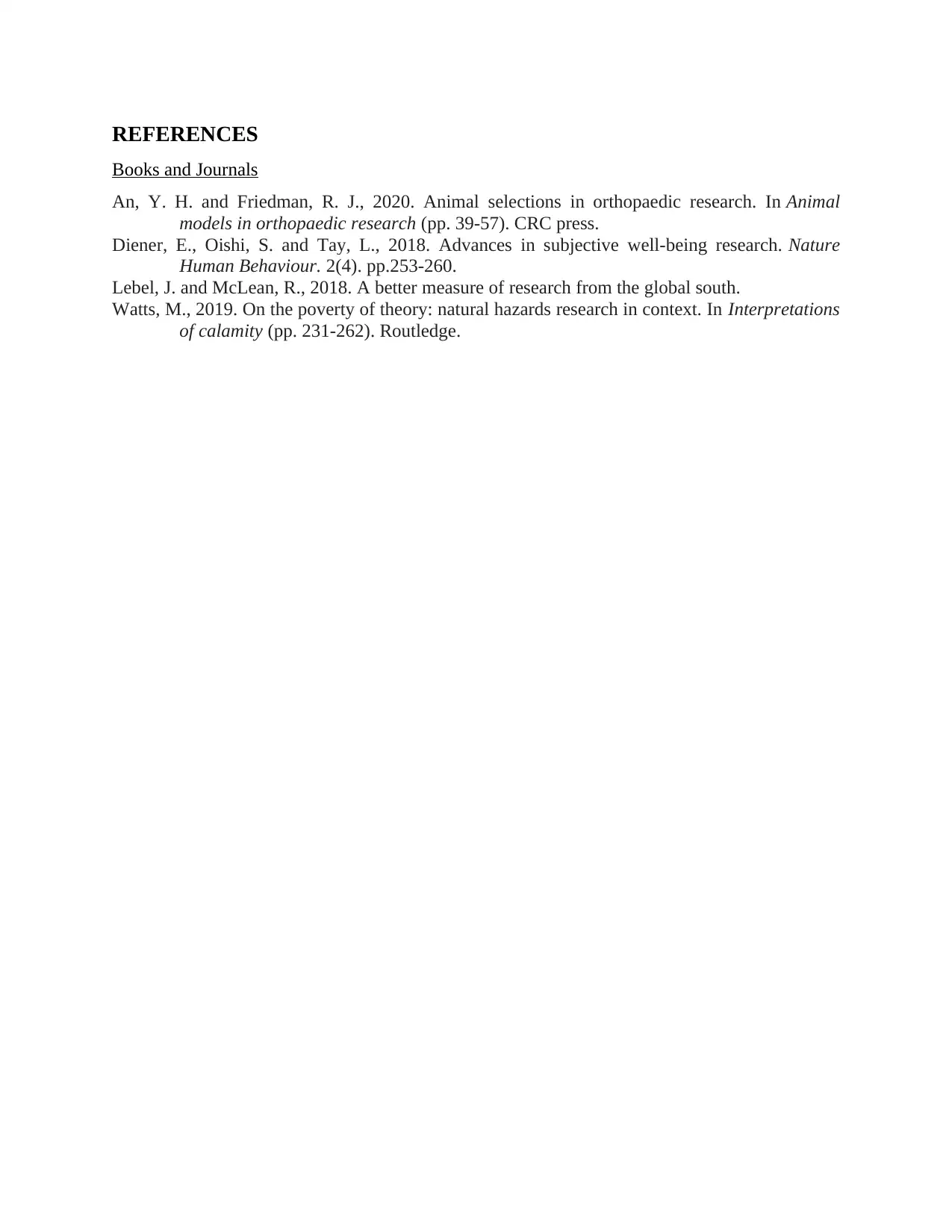
REFERENCES
Books and Journals
An, Y. H. and Friedman, R. J., 2020. Animal selections in orthopaedic research. In Animal
models in orthopaedic research (pp. 39-57). CRC press.
Diener, E., Oishi, S. and Tay, L., 2018. Advances in subjective well-being research. Nature
Human Behaviour. 2(4). pp.253-260.
Lebel, J. and McLean, R., 2018. A better measure of research from the global south.
Watts, M., 2019. On the poverty of theory: natural hazards research in context. In Interpretations
of calamity (pp. 231-262). Routledge.
Books and Journals
An, Y. H. and Friedman, R. J., 2020. Animal selections in orthopaedic research. In Animal
models in orthopaedic research (pp. 39-57). CRC press.
Diener, E., Oishi, S. and Tay, L., 2018. Advances in subjective well-being research. Nature
Human Behaviour. 2(4). pp.253-260.
Lebel, J. and McLean, R., 2018. A better measure of research from the global south.
Watts, M., 2019. On the poverty of theory: natural hazards research in context. In Interpretations
of calamity (pp. 231-262). Routledge.
1 out of 7
Related Documents
Your All-in-One AI-Powered Toolkit for Academic Success.
+13062052269
info@desklib.com
Available 24*7 on WhatsApp / Email
![[object Object]](/_next/static/media/star-bottom.7253800d.svg)
Unlock your academic potential
Copyright © 2020–2026 A2Z Services. All Rights Reserved. Developed and managed by ZUCOL.




